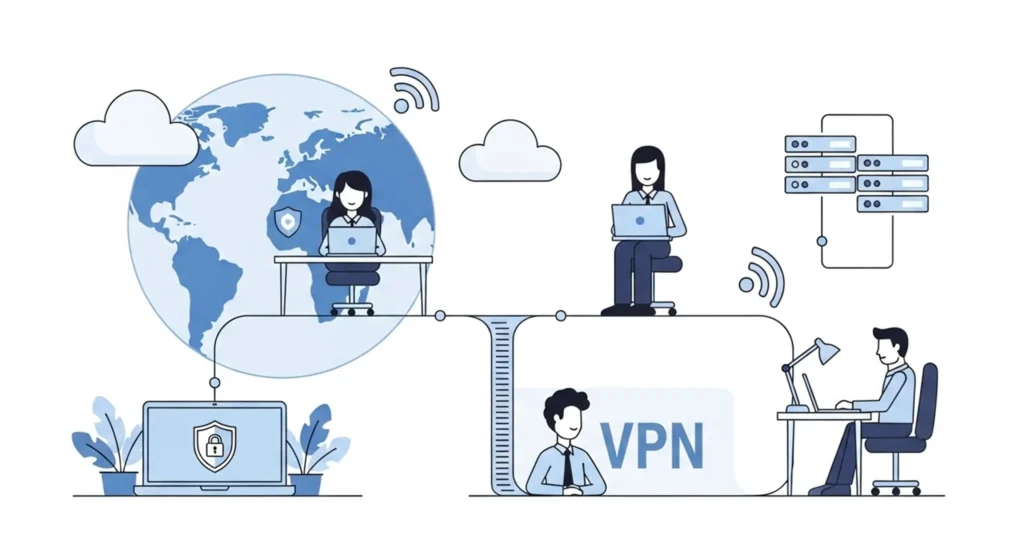
Is Your Business VPN-Ready? Why Securing Remote Work Is No Longer Optional
Imagine this: It’s 9 AM on a Monday, and your remote employee logs into your company system from a café Wi-Fi in another country. The connection looks harmless, but a hacker lurking on that public network just intercepted sensitive client data.
Scary, right?
In a world where remote work has become a norm, not a trend, this is a very real danger. Cybersecurity threats are soaring, and businesses—especially small to medium enterprises (SMEs)—are prime targets. Whether you manage a remote team or handle sensitive data, a Virtual Private Network (VPN) might be your business’s most essential security tool in 2025.
In this guide, we delve deep into how VPNs protect businesses, enable secure remote access, protect intellectual property, and improve data privacy—with real-world examples, expert insights, and practical tips.
Table of Contents
What Is a VPN and Why Does Your Business Need One?
Virtual Private Networks (VPNs) are encrypted tunnels that allow your employees to securely access the internet and private company data, whether they’re working at home, in a co-working space, or halfway around the world.
Benefits of VPNs for Business:
- End-to-End Encryption: Protects data from prying eyes—even on unsecured networks.
- Remote Access to Corporate Resources: Seamlessly connect to company servers and apps.
- Bypass Geo-restrictions: Enable global teams to work as if they’re on one local network.
- IP Masking: Hide real user IPs, shielding against cyberattacks and tracking.
- Compliance Assistance: Helps businesses meet industry regulations like GDPR, HIPAA, and PCI-DSS.
Did You Know? According to IBM’s Cost of a Data Breach Report 2024, the average data breach cost was $4.45 million—with remote work contributing to longer breach lifecycles.
How VPNs Strengthen Remote Work Security
Remote work isn’t going away anytime soon. But it brings significant risks: employees using personal devices, non-secure Wi-Fi, and unsupervised access to sensitive systems.
Here’s How a Business VPN Solves This:
🔒 Secure Company Data
Business VPNs encrypt data shared between devices and company servers, so even if intercepted, it’s unreadable.
🌍 Enable Safe Global Access
Your team in Manila or Manchester can access company systems safely and quickly, without worrying about local internet censorship or risk.
🧑💻 Centralized Access Control
Control who gets access to what, with tools like:
- Role-based access
- Two-factor authentication (2FA)
- Unified threat management dashboards
Example: Remote Accounting Firm
An accounting firm with clients across the U.S. adopted NordLayer, a business VPN. Before implementing it, they suffered a phishing attack due to unsecured remote logins. With the VPN in place, they now enforce AES 256-bit encryption and user-level access, keeping client financial records safe.
What to Look for in a Business VPN
Choosing the right VPN can be overwhelming. Here’s what to consider when selecting one for your organization.
1. Enterprise-Grade Encryption
Look for AES-256 encryption, the same standard used by governments and banks.
2. Dedicated IP and Server Locations
Custom server options allow only your employees to access data, reducing device exposure.
3. User Management Tools
Features like user roles, group policies, and activity logs are essential for IT admins.
4. Scalability
Choose a solution that grows with your business—adding users, teams, or locations easily.
5. 24/7 Support & SLAs
Downtime costs money—ensure you get experts when you need them.
Trusted VPN Providers for Businesses:
- NordLayer – Perfect for SMEs with remote teams.
- Perimeter 81 – Offers advanced network segmentation and Zero-Trust Network Access.
- Cisco AnyConnect – Ideal for larger enterprises.
- Twingate – Popular among startups needing zero-trust network access.
VPN vs Zero Trust Access: Which Is Better?
While VPNs are a strong security measure, Zero Trust Network Access (ZTNA) has increasingly gained popularity. But they can work together, not against each other.
| Feature | VPN | Zero Trust Access |
|---|---|---|
| Security Principle | Encrypts entire network traffic | Trust nothing, verify everything |
| Device Control | Limited | Strong device monitoring |
| Speed | Can be slower | Generally faster and app-specific |
| Use Case | Best for remote access | Great for segmented access |
Most businesses today combine VPNs and ZTNA policies for better layered defense.
Real-World Case Study: How a SaaS Startup Secured Their Remote Teams
Company: FinTronix, a SaaS fintech startup with 40 employees
Challenge: Developers handling financial data worked from multiple countries, using varying security practices.
Solution: Implemented Perimeter 81’s VPN along with role-based access and endpoint security.
Outcome:
- 35% drop in phishing attempts
- 100% compliance with SOC 2 standards
- Faster logins and reduced IT support requests
Their CTO shared:
“After deploying a VPN, we not only secured our stack but also built customer trust through compliance and transparency.”
Common Mistakes to Avoid When Using Business VPNs
Even the best VPN won’t protect you if used incorrectly. Here’s what businesses often get wrong:
- ❌ Using consumer-grade VPNs instead of business VPNs
- ❌ Giving blanket access to all company systems
- ❌ Poor password hygiene and lack of 2FA
- ❌ Failing to update or monitor VPN client software
✅ Pro Tip: Always combine VPNs with endpoint protection, firewalls, and secure user onboarding/offboarding protocols.
VPNs and Compliance: Stay on the Right Side of the Law
Many industries require stringent privacy controls. VPNs can support compliance for:
- HIPAA (Healthcare): Protect patient data in remote environments
- GDPR (EU): Ensure private communication over public networks
- PCI-DSS (Retail/Finance): Mask customer cardholder inputs
Ensure the VPN provider offers detailed audit logs, encryption certificates, and data protection guarantees.
Final Thoughts: Future-Proof Your Business with a VPN
In today’s digital-first, hybrid-work era, having a business VPN is not a luxury—it’s a necessity. From preventing cyberattacks to ensuring compliance and enhancing remote productivity, the benefits are clear.
Whether you’re a startup founder, an HR manager juggling remote onboarding, or an IT director tightening your network, a well-chosen VPN can be the silent guardian your company needs.